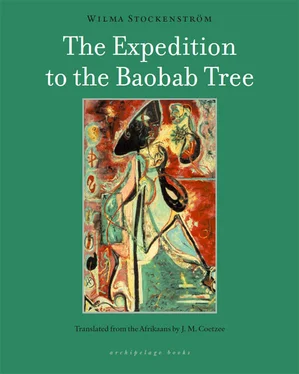The talk grew dull. He asked to be carried to his room. I say asked, not commanded. He asked in a whisper.
Left alone with him, I held him tight and soothed him, for he rebelled against his weakening and was far too fidgety; but then out of pity I let him be and by watching I understood what his hand was grasping for. He was trying to tear the fine web that death was spinning around him. When he jerked in spasms the web vibrated and shimmered slyly in anticipation. Tighter and tighter it was spun around him, so that the threat of sounds outside the room could not penetrate and the murmur of people with concern or concerns remained far outside the ring of his death stillness.
I let the invalid nestle between my drawn-up knees with his head on my breast. In his language I whispered lewd stories which made him smile blissfully in my arms. Shrunken baby, what an easy delivery for me. I fed you with the deathsmilk of indifference, for it could do your dried-out body no more harm and perhaps it was your way out, this being set free of any charitableness. Any pity would only delay your departure painfully.
One morning I climbed up to the highest terrace on the roof of my owner’s house to breathe in the morning freshness and look out over the city and the sea, at the skiffs lying drawn up on the sand, several of them belonging to him whom I had just said farewell to forever, that would probably now, like me, be disposed of. My future and the future of my fellow slaves, women and men, as well as that of the skiffs over there in the rosy daybreak, as well as that of the stores of elephant tusks and ambergris and iron, and that of the great house now at last plunged into mourning, and that of his fragrant garden down below me, had been allotted a precarious fate. Only those who have, have security as well. For me there was only insecurity. I waited, expecting to sigh. I waited for my feelings to well up. It was now the time for that.
I who come from the heart of the country bear the murmur of waters subliminally with me, a water knowledge preserved in my tears and saliva, in the blood of my veins, in all the juices of my body. I who knew how to extinguish attacks of fever with my water being, I found myself crying uncontrollably here in the morning stillness about so many things all at once that I would try to sob my tangle of thoughts to death rather than seek an interpretation that would amount to mourning but also a feeling of relief, anxiety about the future but also plain happiness about the purity of the morning after the oppressiveness of days and days in a sickroom.
With a corner of my robe I dried my eyes and cheeks and climbed back down to the garden. I had to find out what was going on. I walked down to the beach and from there — for my call to the solitary dhow in the bay remained unanswered — from there I walked through the neglected waterfront area, hoping that no one would notice my absence in the bustle and diminished supervision that follow such an important death. And even if they did notice it, what did I care. I was dumbfounded with grief, but more, with longing, and did not care who saw it. My longing was a hard little nut hidden deep within me. I did not care who knew of it now. Now, after my benefactor’s decease, this feeling was my only certainty, and it helped me forget my fear of what lay ahead. Frivolous, perhaps, if I had been a woman who could have decided her own fate, but surely a permissible escape for the owned class to which I belonged. To fall foolishly in love and try to pocket happiness where happiness waited visible through a chink, and the time possibly favorable.
So now I searched for the man I had fallen in love with. I heard him laugh behind a heavy, richly carved teak door in secret consultation in his life away from me. I saw him disappear round a corner. I smelled him out, wherever he might stay, where he might yet walk, for he had promised to come again, and he would come again over the swell on the lee side of a billowing lateen sail, and I followed him in my imagination where the hem of his robe dragged through the mud, brushed over the fleshiness of a broken melon, and whisked over sand and fins and scales. I lingered with him where he stopped before the market women, occupied in observing how the poorest of the poor lived. Clouds of flies swarmed up from the piles of grilled fish and meat. They settled in patterns against the blue of this clothes and crawled over his nose and eyes and forehead, at the wet corners of his mouth, wherever there was moisture.
An old acquaintance came shuffling along with a flat basket of plantains on her head which she put down with a groan; then she took up position with legs stretched out in her traditional place under the shade tree. He began to chat to her and to others round about. He listened to brusque surly answers, embarrassed answers or equally embarrassed silences, to eagerly supplied information and quick-witted remarks in answer to questions from him, this presumptuous gentleman who was certainly not a client, making his own deductions. And with his inquiries about the price of crabs and clams and mussels and the availability and readiness to hand or otherwise of meat and fish and firewood, he built up cases using his own information, acquired on the spot, with which to refute other later arguments, opposing this information to the vague theories of rulers and well-meaning people. An attentive man. An inquisitive person who came to acquaint himself with the lot of the lowest, so much more complicated than the easy existence of a slave girl in a generous household, as he often pointed out to me.
My easy, indolent existence, yes, an existence now perhaps at an end.
Where did I find myself now, and was this smell of smoldering fear not familiar to me? The stench of blood. From this fear I never escaped, this trusty dizziness that impaired my sight, that made me brush with my hand over my eyes to see better and made me rue the act at once, for where I found myself, I discovered, was very near the slaughterhouse where I was sometimes sent by my second owner to buy entrails for his slaves. This smell known all too well to me, this lowing and bleating. Slippery heart liver lungs and gullet messily wrapped in leaves, a messiness too prone to slip out to carry on my head, I held it before me a little way from my body and walked away from a desolation soiled with dung and filth where animals buckled at the knee and the sad palms in their long dresses rustled dry leaves and grated, powerlessly anchored. Walked off from the joking butchers’ teasing and provocative remarks and obscene gestures to go and cook the food that I would share with many mouths, and plot how to keep the liver aside for myself and mine, and how to pinch a scoopful of my master and his wife’s rice in the — advantageously for me — untidy running of the household.
In two low huts with collapsed roofs we lived, the slaves, all together, not separated by sex. From sunrise to late at night we toiled for him, the spice merchant. The work was what separated us. The men worked in his warehouse on the waterfront and the women in his residence. From far and wide we came, we spoke a variety of tongues, but here we got along by mangling the natives’ language and turning it into our idiosyncratic workers’ language. We were acquired secondhand, third-hand, even fourth-hand, mostly still young and healthy, we women fertile and rank. At night it was legs apart for the owner on his sweaty skin rug. Some of us welcomed it. Not I. He was clumsy and rough. I envied the slaves exempted from this sort of service. It brought a certain freedom along with it, after all, to be unmanned, I thought. I did not mind standing in front of the fireplace. I did not mind toiling with pick and hoe in the garden in the murderous heat to keep it neat around his mango trees and yam vines. I did not mind tidying his house under the eye of his shrew of a wife, obeying her expressionlessly, keeping my murmurs for the sleeping quarters, and even there being careful, for there were tell-tales amongst us. And to be discovered meant that your tongue was cut out.
Читать дальше












